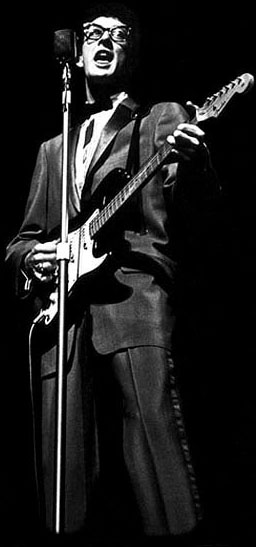Buddy Holly
Buddy Holly was one of the early pioneers of rock and roll, along with Chuck Berry he helped shape the future of modern music, paving the way for The Beatles, The Beach Boys, The Rolling Stones and all that followed. Whereas Elvis had a great voice and stage presence, he was mot a great instrumentalist or songwriter. Holly was among the first to concern himself with all aspects of his music, including recording. He was a prolific songwriter and though equipment was primitive at the time his guitar playing was innovative and along with Chuck Berry he can be credited with making the guitar the most important instrument in all genres of modern music.
His guitar playing and songs may in todays context appear simple, but his great legacy is the influence he had on the development of rock and pop.
His professional career in music was very short, only about 18 months, before he was tragically killed an an airplane crash.
Contents |
Early Life
Buddy whose full name was Charles Hardin Holley was born September 7, 1936 in Lubbock, Texas. Undoubtedly his first experiences in music would have come from singing hyms in church. Other musical influences would have come via radio where he heard country music, most notably the music of Hank Williams. It is also likely that he will have listened to blues music via radio.
Buddy began taking piano lessons at the age of 11 but quickly switched to acoustic guitar. In 1951 Buddy and Bob Montgomery a school friend who also played guitar began playing together as Bob and Buddy, playing school functions and appearing on local radio shows. They were soon jouned by Larry Welborn on bass, but didnt often use drums. The would play mainly country songs, with Montgommery taking lead vocal and Buddy Holly providing the harmonies.
1955 proved to be an important year for Buddy and Bob. They played in a number of important shows in Lubbock as support for famous rock and roll acts such as Elvis and Bill Hailey & The Commets. This influenced Buddy greatly in that his music moved more towards rock and roll. Also these shows brought Buddy to the attention of Eddie Crandall who negotiated a recording contract for Buddy with Decca records.
Music Career
Decca misspelled his name and from then on he became Buddy Holly rather than Holley. His first recording sessions took place in 1956 in Nashville and one of the songs recorded at that session was "That'll Be The Day" which was eventually to become one of his biggest hits. Decca however wernt particularly impressed and released other songs which were not sucessful. Decca liked Buddy's songs but were not convinced of his worth as a recording artist. They suggested that they use other singers to record his songs, but Buddy resisted this. The result was that they cancelled his recording contract but insisted that he could not re record any of the songs recorded with them for five years.
Norman Petty then took over management of Buddy and his group. Petty took Buddy to his recording studios in Clovis, New Mexico. Some of the best recordings of Holly's songs were made there with Petty acting as recording engineer. The dispute with Decca meant that Buddy was unable to release his songs under his own name and they were released under the name of The Cricketts on Brunswick records. Petty also claimed and insisted upon a writing credit.
"That'll Be The Day" was again released and began to sell eventually becoming a big hit. THe hits for BUddy and the Crickets continued for the next year or so and the group toured extensively also.
Death
Discography
Video






